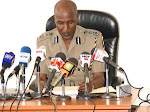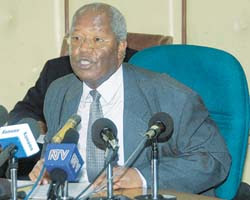 The performance of the Kenyan Police Commissioner Major General Ali in matters of high public importance and his stance on political issues are determinant factors for the conclusion that his actions are in contravention of law and disobedience of public duty.
The performance of the Kenyan Police Commissioner Major General Ali in matters of high public importance and his stance on political issues are determinant factors for the conclusion that his actions are in contravention of law and disobedience of public duty.
Major General Ali failed to eradicate corruption and inculcate efficiency in the Police especially at the Traffic Department. Ali disregarded any major steps, such as setting up an investigative team to investigate and eradicate corruption. The outcome was that due to lack of serious traffic law enforcement hundreds of Kenyans continued losing their lives in road carnage majority of which involved Public service vehicles and heavy commercial vehicles. Even now it still remains evident how Matatus continue contravening laws with impunity under the noses of the Traffic Police.
Combating armed crime was a display by police officers of their capability and willingness to perform and offer their services to the public and was not an act of benevolence from the police chief. The fact being that it is part of the police chief’s job requirement to instil professionalism, impart a conducive working environment and ensure efficient performance of staff under his command in return of his services he gets an agreed salary.
The recent [pre-election] invasion of Nairobi city streets by hawkers and pickpockets brought about disorder, congestion, thuggery and anguish at the expense of peace loving and law abiding residents. It led to a situation of a public outcry with the Town Clerk admitting that the situation had reached a level which was beyond the council’s control and he blamed the police for failing to heed his request and intervene and enforce the law (the law empowers a police officer to enforce bye-laws). It is common knowledge that the hawkers were in fact potential voters being wooed by the Party of National Unity (PNU) and we also witnessed PNU members holding government positions coming out with all excuses for not being able to remove this nuisance. Some party supporters and members are even on record as having supported the hawkers actions of defying the law. One of the reasons given was that the Police did not have enough manpower to deal with the situation as they were busy with the election planning. In the recent [post-election] crisis the public have witnessed the extent of man-power and equipment the Police chief has at his disposal.
During the vote tallying the Police commissioner in his position as the highest ranking law enforcement officer within physical proximity of KICC, had the responsibility of stepping in to investigate complaints pointing to commission of criminal offences which were incessantly being raised by Orange Democratic Movement (ODM) party members. This was an issue of national concern and his was the absolute authority and under the premises of the law there was no authority at the ECK that could have stopped him from carrying out his lawful duty by ordering the respective CID units under his command to carry out on the spot investigations to verify the complaints raised.
Major General Ali ignored his public duty and did not intervene and initiate immediate investigations. He assumed the role of a subordinate to ECK and continued lending security support unquestionably and in complete ignorance of what had transpired. This was a blatant disobedience of public duty.
In law any law enforcement officer who possesses the required powers conferred on him by law and has at his disposal man power and equipment is required to intervene and discharge his duties when, during the possession of all said facilities, a crime is being committed in his presence; or is required to investigate and apprehend offenders after commission of the crime.
When such an officer abdicates this duty he stands to be charged for abetting that particular crime.
Major General Ali’s evident display of favouritism to the PNU in discharge of his duties and his post election period actions (executed by those under his command) have exascerbated the political crisis deeper. Major General Ali’s actions remain questionable and in violation of various laws of the country one among which requires him to maintain political neutrality.
In such circumstances by way of justice and when the environment is conducive and neutral, an independent inquiry requires to be set up to investigate the conduct of Major General Ali and the apparent laws contravened in particular the Public Officer Ethics Act [ 8, 9a,10(1), 10(2), 16 (1) a &b, 22 a &b, 24 (1) a &b ] and also the Police Act , Penal code, Constitution of Kenya (including Freedom of speech Part V) and oath of office among others.
K. Khan
NAIROBI
21st January 2008
Some of the sections of Law which the Police Chief contravened:-
The Public Officer Ethics Act 2003
8. A Public officer shall, to the best of his ability, carry out his duties and ensure that the services that he provides are provided efficiently and honestly.
9. A Public Officer shall_
carry out his duties in a way that maintains public confidence in the integrity of his
his office
10.(1) A Public Officer shall carry out his duties in accordance with the law
10.(2) In carrying out his duties, a public officer shall not violate the rights and freedoms of any person under PART V of the Constitution
16.(1) A public officer shall not, in or in connection with the performance of his duties as such-
act as an agent for, or so as to further the interest of, a political party; or
indicate support for or opposition to any political party or candidate in an election
22. A public officer shall practice and promote the principle that public officers should be-
selected on the basis of integrity, competence and suitability;or
elected in fair elections
24.(1) A public officer contravenes the Code of Conduct and Ethics if-
he causes anything to be done through another person that would, if
the public officer did it, be a contravention of the Code of Conduct and
Ethics; or
he allows or directs a person under his supervision or control to do
anything that is a contravention of the Code of Conduct and Ethics.
Criminal Procedure Code
62. A Police Officer may interpose for the purpose of preventing, and shall, to the best of his
ability, prevent the commission of a cognizable offence.
P.S. (cognizable offence is an offence which allows a police officer to make an arrest without a
warrant)
Penal Code
5.(2) Every Police Officer shall promptly obey and execute all orders and warrants lawfully issued to him, collect and communicate intelligence affecting law and order and take steps necessary to prevent the commission of offences and public nuisance, to detect offenders and bring them to justice and to apprehend all persons whom he is legally authorised to apprehend and for whose apprehension sufficient ground exist.















|